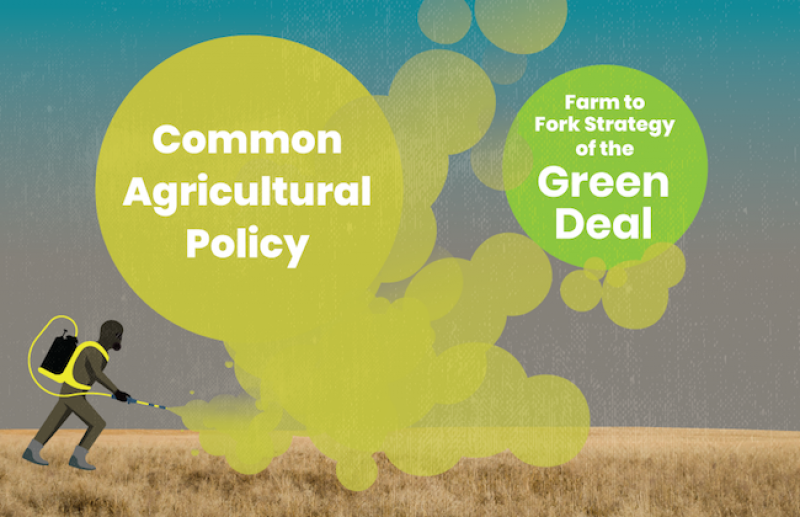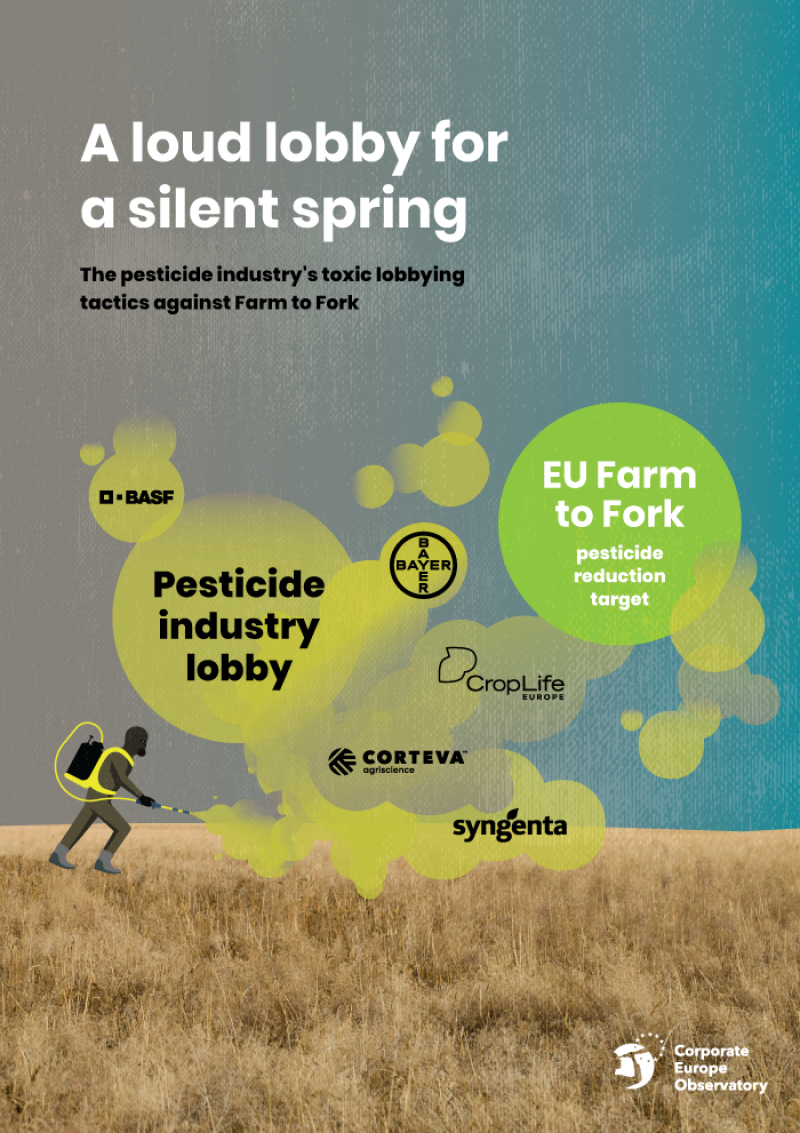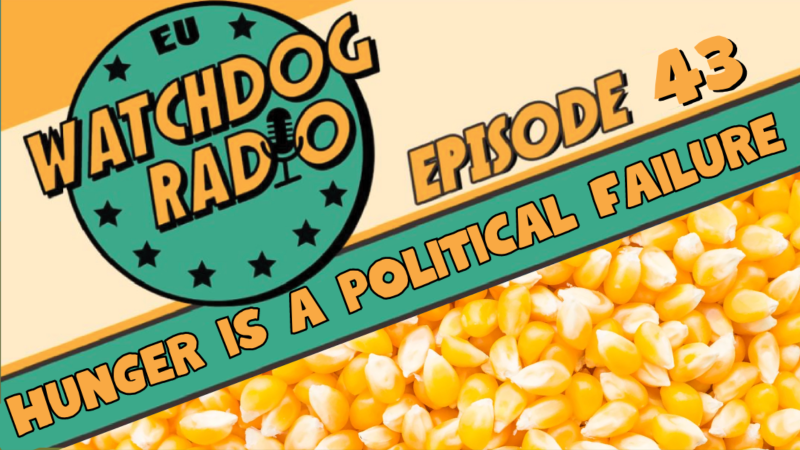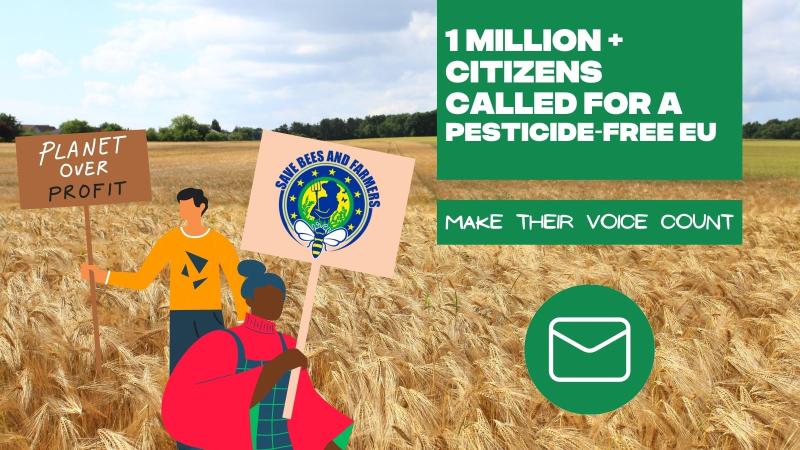Stay always informed
Interested in our articles? Get the latest information and analysis straight to your email. Sign up for our newsletter.

As the right wing EPP grouping of the European Parliament gears up with 2024’s election in its sights, it senses blood as its hunts down key aspects of the Green Deal. Legislation to protect biodiversity and make food production more sustainable is under concerted attack.
Things are getting pretty wild in political Brussels these days. While the EU elections are still one year away, the right wing grouping of the European Parliament, the European People Party (EPP), is already gearing up for an electoral frenzy and on the hunt to kill all meaningful greening legislation of the Green Deal, in a bid to gain business and farmers’ support. The anti-nature crusade of the Christian Democrats and conservatives is so out of control that it’s not just civil society calling them out; even businesses and catholic groups have joined in the criticism.
However, the fight back is underway.
This week the European Parliament will see an important vote on the Nature Restoration Law (NRL) and on a report on Food Security. The votes take place in a highly polarised political climate in which the EPP, backed by parts of Renew and extreme-right populists, are attacking every meaningful piece of EU-legislation to protect biodiversity and make food production more sustainable. This not only endangers ecosystems already under great pressure, but food security, small scale and sustainable farming, and policies to tackle climate change. Healthy ecosystems are essential for sufficient carbon storage and in order to reach climate goals.
The Guardian reported that UN environment chief Inger Andersen urged policy makers to show leadership for future generations ahead of the vote and deliver on the promises the union made at Cop15 just 6 months ago. She condemned those that had turned restoring biodiversity into a culture war issue. And now Sweden, which holds the current EU-presidency reportedly want to take the vote on the NRL off of the Environment Council meeting scheduled 20 June.
Corporate Europe Observatory exposed the pesticide industry's lobby tactics to delay and derail the pesticide reduction law SUR in its report 'A Loud Lobby for a Silent Spring'. A key lobby tactic from industry was to demand more 'impact data' from the European Commission, under the pretext of food security and the Ukraine war. Conservative and other right-wing parties, as well as big farm lobbies, have joined industry to wage this campaign are echoing its talking points.

Now conservatives have launched into election mode, and it appears that in their political messaging that means 'anything goes', including promoting fake news and denying scientific evidence of biodiversity decline. For example as the debate in the European Parliament got more and more populist and less fact-based this spring, NGOs were forced to publish a fact check after the European Citizens’ Initiative debate on ‘Save bees and farmers’ in the EP, in order to debunk some of the conservatives' more egregious arguments.
The sad truth is that even the most telling and alarming scientific facts do not appear to change anything in the irresponsible attitude of the Christian Democrats, nor slow down their attacks on the Green Deal, notably on the Nature Restoration Law and Pesticide Reduction Regulation (SUR). The main – and very fake – argument they use since the war in Ukraine started has been that ‘we need to boost food production and thus cannot invest more in biodiversity protection’.
It’s a position that – as Corporate Europe Observatory revealed last year- has been carefully prepared by powerful agrochemical corporations and their lobby agents. For instance we exposed Croplife Europe’s lobby strategy in our report ‘A Loud Lobby for a silent Spring’. Officially the agrochemical association declares itself in favour of the Farm to Fork Strategy’s goals, using slogans like “doing more with less”. But in reality the pesticide industry hates the prospective legal reduction targets and uses paid academic studies that supposedly prove that the EU reducing pesticide use would result in dramatic yield losses. A mere five days after the invasion of Ukraine, the Deutsche Bauern Verband published a call to stop all greening and use exemptions to greening measures of the Common Agricultural Policy (CAP). These kind of lobby strategies are about using plausible moral cover (the war in Ukraine, ‘concern’ over global hunger) to dodge legal obligations and reduction targets and other systemic changes.
The recent Dutch elections results, which made the brand new BBB (‘Farmer-Citizen Movement’, an agrarian and right-wing populist party) the biggest political party in the Netherlands electrified the EPP. The issue became top priority, and now even Von der Leyen seems to be backtracking on the Green Deal to avoid losing the support of the EPP. Manfred Weber, the group’s leader in the European Parliament, recently said in the Financial Times that he welcomed Von der Leyen’s decision “to reflect on the scope and speed of this process”, and added this nonsensical soundbite: “If climate wins and the rest of society loses we will not achieve net zero”.
Hunger
The EPP will not change its position before the 2024 European Parliament election. Despite all facts to the contrary they insist on linking the reduction of pesticides and fertilizers to lower food production to hunger. This is despite the fact that every single expert would tell them that hunger is not a question of lacking food production; rather it is a result of policies and governance failure. No less than 3339 scientists signed an Open Letter, expressing their “deep concern about the unjustified attack on the Sustainable Use Regulation (SUR) and NatureRestorationLaw, based largely on misinformation. They urge policymakers “to continue the legislative process”.
So says also Special UN Rapporteur on the right to food Michael Fakhri in our latest podcast. Fakhri presented his report on Conflict and the right to food to the Human Rights Council of UN General Assembly this Spring. He repeats over and over again that “hunger and food insecurity always are a result of political failure” not an issue of production or lack of food. He says, “How do we change this? That’s the political and social question.”
The argument that we cannot afford more sustainable food policies, because we need to boost food production makes Fakhri laugh: “It’s like saying when your house is on fire, use more gasoline to burn it down faster. It’s the politics of fear. Politicians are afraid to make the real changes. Why is it that politicians commit to a Green Deal, but when the stakes get higher, they are too afraid and go back to the old ways, when we all agree that these old ways are the problem?”
One of the main problems according to Fakhri is that “our current food system depends on chemical pesticides and fertilisers, provided by a small number of corporations. We depend on them like a drug addict. So the challenge is to kick that addiction, step by step and to transition to a food system that is not dependent.”
In his UN report, Fakhri gives an account of how different forms of violence in food systems harm people and generate the conditions that lead to human rights violations, like hunger. He writes: “The current food system is causing ecological violence, destroying life itself and is not regenerative but disruptive. When you destroy ecosystems you also devastate people’s life. You cannot separate the two. There is an increasing trend of human rights- and ecosystem -defenders being targeted and killed. On purpose, to create fear among communities and facilitate commercial exploitation.”
According to Fakhri food systems not only produce food but also amplify and produce violence that makes people more poor, vulnerable, and marginalized: “The choices we make today will have an impact on the generations to come. Be brave and do what people are asking for.”
In their defence of a destructive status quo and a benefitting agro-business the EPP seems to forget that for example EU citizens asked in the Future for Europe process to make agriculture more sustainable.

A tipping point: at odds with science
The EPP appears deaf to the warnings of thousands of (climate) scientists and millions of citizens reaching out to them in despair. Even when scientists tell us now that the Amazon has reached a tipping point, with 18 per cent of the vitally important ecosystem destroyed, many of the remaining forests now hotter and drier, and turned into a CO2 emitter instead of a carbon sink. This tragedy is due primarily to soy-cultivation for animal feed and meat production (including in Europe), as well as logging.
Using too much land in a destructive way to produce feed for livestock does not only happen in Brazil but also in Europe.
In the Potsdam Statement the EU's leading scientists have warned that “efforts to abandon the sustainability targets of the Farm to Fork-strategy (including greenhouse gas emission reduction, reduction of nitrogen fertiliser and pesticide use, and protection of fallow land for biodiversity) do not shield us from the current crisis, they rather worsen it and make the crisis permanent”.
In line with the Green Deal’s Farm to Fork and Biodiversity Strategies, scientists recommend reducing the production of livestock and thus the cultivation of livestock feed (almost two thirds of the EU's cereals are currently used for animal feed) and increasing the cultivation of cereals for food. At the same time, the goals of expanding biodiversity-enhancing structures in European agriculture should be pursued further.
Unfortunately, the EU derogations which allow farmers to cultivate intensively fallow land since the Ukraine war has had exactly the opposite effect, as a recent analysis presented by NGOs shows: Ecological Focus Areas (EFAs) dedicated to biodiversity have been cut by an average of 40 percent in 21 EU member states, mainly for the cultivation of animal feed.
At odds with core Christian values
Civil society recently highlighted that the demands for further suspensions of the environmental measures of the CAP (set-aside, crop rotation, no pesticides, etc) using the war in Ukraine as a false pretext, is at odds with a broad scientific consensus about the vital importance of stopping ecosystem collapse for future food production and farmers. Moreover, the current political demands to stop essential parts of the Green Deal such as the legal proposals to restore nature (NRL) and reduce pesticides (SUR), are in stark contradiction with core Christian Democratic values as affirmed in the manifesto of the European People's Party, The Future of Christian Democracy. The manifesto clearly says that the ecological crisis "threatens what makes our world habitable", which is why we "cannot continue... as we have done in the past" but must strive to "leave a world where life remains".
The signatories stress that securing a sustainable future for Europe requires a Common Agricultural Policy that is consistent with the objectives of the Farm-to-Fork and Biodiversity Strategies of the Green Deal, and which combine ecological policies with fair socio-economic prospects for farmers. In this endeavour, the signatory organisations pledge their full support to the Commission President and stress that giving in to the short-sighted demands of agrochemical lobbyists and their political allies would be "a mistake of historic proportions". It does not make sense from either a climate change perspective, nor from a biodiversity perspective nor from the perspective of vibrant rural communities and prosperous family farms, to keep investing billions of taxpayers’ money into producing feed for meat production on an agro-industrial scale.
Maybe the EPP should be reminded not only of their own writings but also that of Pope Benedictus XVI, in his Encyclical Letter Laudato Si on the ‘care for our common home’ published in 2015, followed five years later by the Vatican release of 'Journeying Towards Care for Our Common Home’, which “offers a guide to all Christians on how to maintain a healthy relationship with Creation”.
A little historic parallel
Over fifty years ago the Club of Rome commissioned a team of MIT researchers to produce ‘The Limits to Growth’ report, with its alarming message: “The earth’s interlocking resources – the global system of nature in which we all live – probably cannot support present rates of economic and population growth much beyond the year 2100, if that long, even with advanced technology”. Just few weeks before that a European Commissioner for agriculture wrote a urgent letter to the then president of the EC, after reading the Meadows report. The letter was dated 9 February 1972, three weeks before the publication of the Meadows report. Its author, then-European Commissioner for agriculture Sicco Mansholt, was the architect of the Common Agricultural Policy (CAP).
What was already certain for Mansholt back then was that “we should stop directing our economic system to the search for maximum growth and a constant increase in the gross national product”.
In the conclusion of his letter, Mansholt wrote about agriculture, which has some painful references to today’s political non-debate. Natural balance will play an increasing role in food production he said, pointing to “the disruption of the ecological balance as a result in particular of the use of pesticides and insecticides which are required for mass production.”
If one compares this vision of the Mansholt letter with the so called European Farmers’ Deal - EPP Vision for Agriculture in Europe adopted 5 May in Munch, one can only question the idea of progress: “We should support farmers to use less inputs such as pesticides, fertilisers and antibiotics and we believe that the CAP (...) must support them in this. However, now is not the time to endanger food security in Europe. Therefore, we reject the proposal on the Sustainable Use of Pesticides as the reduction targets chosen are simply not feasible and the proposal does not offer farmers viable alternatives.”
This is what real experts on food security say: “The reality today is that the world already produces more than enough food to feed a growing population, according to UN data. Indeed for the past two decades, the rate of global food production has increased faster than the rate of population growth. But unlike what voices for ever-more intensification claim, this hasn’t stopped rising hunger. Rising hunger has little to do with levels of production — and everything to do with where that food goes and doesn’t go. Around a third of the food we produce is thrown away or left to rot. A vast majority of the world’s calories are used to feed animals — livestock takes up nearly 80% of global agricultural land (factoring in feed) while producing less than 20% of the calories. Growing more food to direct to any of these ends will do nothing to reduce hunger or famine”.
But despite all this, according to the EPP, big data, drones, precision farming, and new GMOs – and thus more power concentration in the hands of a few global food barons – should do the trick to protect farmers’ livelihoods, vibrant rural communities, and … ecosystems.
While the EPP seems to be launching an EU election campaign based around the identity of ‘the farmer’ and rural areas, it does not say much about the millions of farmers the EU has lost the past two decades, despite billions of CAP subsidies: indeed, one third of EU farms have disappeared in 15 years!
We do not hear much about farmers’ suicides, or agricultural workers getting sick from pesticide exposure. We do not hear much about the land grabbing, about increases of prices for fertilizers, seeds and pesticides. In the first decade fertilizer prices rose by 80 per cent and from 2021 to 2022 by 116 per cent. Data from 1995 to 2017 show that each euro spent on pesticides and fertilizers generated respectively -27 per cent and -25 per cent of gross farm income. Data seem to indicate there is a direct link between decreasing income for farmers (46 per cent less between 2000 to 2020), and the sharp increase of prices for inputs like pesticides and fertilizers.
The existing CAP, along with trade deals and market liberalization, has for decades supported a farming system that is both socially and environmentally broken. It favors those farmers with the largest land area, big land owners and companies. In essence the CAP has become an indirect subsidy to support EU-based food companies’ international competitiveness. The EU’s CAP directs billions in EU taxpayers’ money to fuel climate change, destroy biodiversity, and even undermine farmers’ livelihoods. As Corporate Europe Observatory showed in 2020 in the report CAP vs Farm2Fork ‘agribusiness lobby group Copa-Cogeca, along with pesticides and food industry giants, did their best to stop the then ongoing CAP reform process from aligning with the Farm to Fork strategy of the Green Deal. The ones benefiting from all this are fortemost a handful of companies like Bayer whose profits rose by 35 per cent from 2010 - 2020. This allows further consolidation of the sector as the €56 billion purchase of Monsanto demonstrates. Now, only 4 companies, including Bayer, represent the two thirds of the agrochemical sector. By fighting the pesticide reduction targets as made clear in a disclosed meeting between DG AGRI and Copa Cogeca, Copa is not defending farmers but rather, is ally to these multinationals.
Most farmers are faced with this choice: becoming increasing indebted via an ever-more intensified and productionist model, or vanish from the earth completely. In reality that’s the only deal EPP has for farmers.
